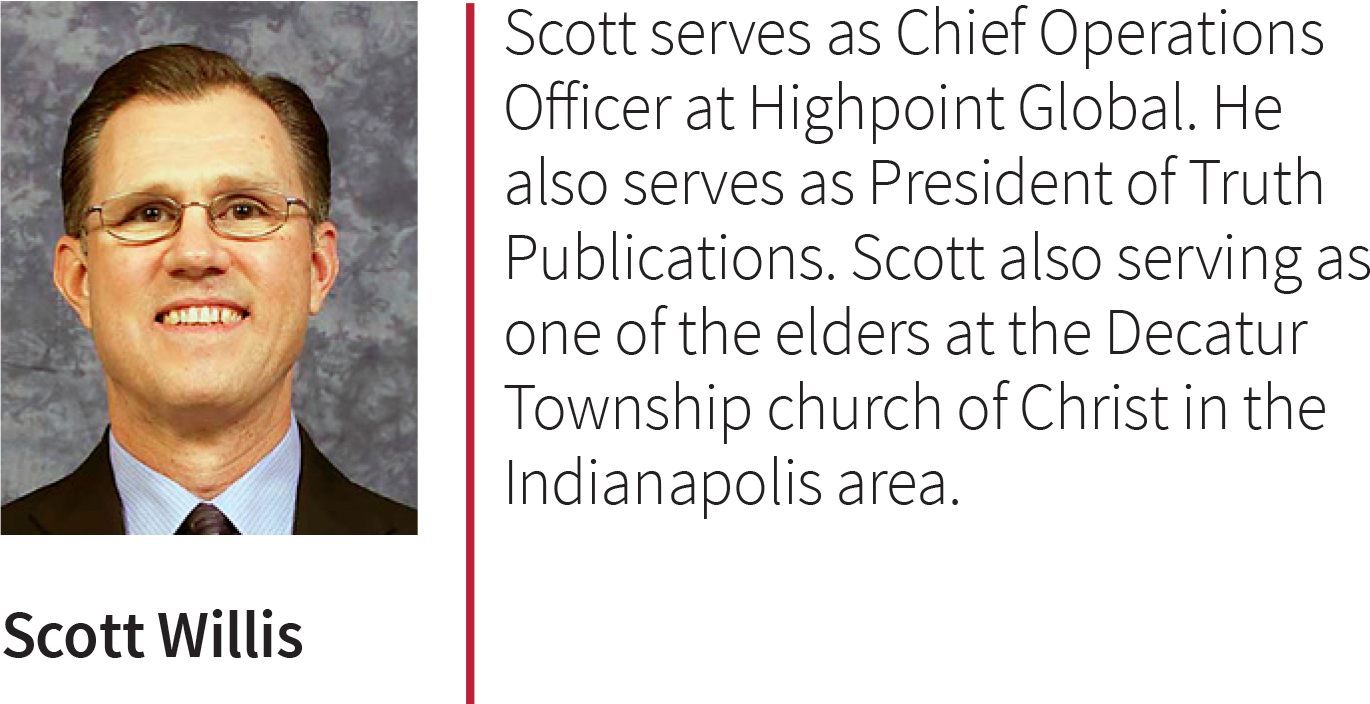by Scott Willis
Synopsis: Contemporary culture rejects the good news of salvation and seeks to impose corrupt conformity upon all. Yet, by allowing God's word to operate in our lives, we undergo a spiritual metamorphosis and are changed for the better.
The message of the apostle Paul in Romans 12:1-2 is familiar to most of us:
I beseech you therefore, brethren, by the mercies of God, that you present your bodies a living sacrifice, holy, acceptable to God, which is your reasonable service. And do not be conformed to this world, but be transformed by the renewing of your mind, that you may prove what is that good and acceptable and perfect will of God (NKJV).
One who has studied God's word with diligence understands the dangers that are associated with a humanistic worldview. There is considerable conflict between the instructions that God has given to His children and what the world generally desires and practices. The morality outlined by God in the Bible has always been under attack by the devil and his angels. That is especially true of modern society and particularly of America in recent years. While not true of every person, there was a time in America when God's word was generally respected, and most folks attempted to follow His teachings. Of course, that has dramatically and sadly changed. Today there is more often disdain for God's standard of morality than there is acceptance of it. People do not want their wishes to be infringed on by others, including God. Most people reject the morality found in Scripture.
When confronted with the truth found in the Bible, people are not affected by it. They lack any sense of shame for the worldly conduct in which they participate, much like the children of Israel in Jeremiah's day. Of that generation, the prophet asked, "Were they ashamed when they had committed abomination? No! They were not at all ashamed; Nor did they know how to blush" (Jer. 6:15).
Sinful behaviors are paraded and celebrated in our modern world. Everyone is expected to accept without judgment whatever deviant lifestyle people choose to follow, except, of course, choosing to follow God. For that, you will be publicly ridiculed.
Of course, the same was true in the first century, which is why Paul gave this admonition. It demands that followers of God must be familiar with His will and respect His authority. One who respects God's will does not seek to change it to conform to his will; instead, he conforms his life to God's will. This is what is meant by the living sacrifice one should make. As we live each day, we should seek ways to serve and please God. At the least, that means we must ensure that what we are doing is consistent with God's will for us.
Moreover, we should be seeking ways to add to our conduct the good works described in God's word (Gal. 5:22-23). After affirming that we have "all things that lead to life and godliness," the apostle Peter listed various ways in which we must continually grow (2 Pet. 1:3, 5-11). In other words, the New Testament contains everything that we need to please God.
Paul exhorted Timothy to "be diligent to present yourself approved to God." The KJV used the word "study," while the NKJV uses "diligent." This implies an effort to know and apply God's word in our lives every day. Doing these things will ensure that we are being transformed from the world.
Conforming to the world is contrasted here with God's will. This is an either-or construction—that means it is one or the other—not both. Christians must understand that distinction. God will not be pleased if we attempt to blend worldliness and godliness. The combination is itself worldliness.
Throughout God's word, we are instructed to avoid any and all types of sin. Paul wrote, "Abstain from every form of evil." (1 Thess. 5:22). Here "abstain" means "to refrain from or hold oneself off from evil." That is to be done from things that have even "the form of evil." The KJV uses the word "appearance" of evil. Regarding this verse, Walton Weaver wrote: "In this sense, Paul is saying that whatever (pantos, all [KJV], or 'every' [RSV, ASV, NASB, NIV]) 'form' (RSV, ASV, NASB) that evil may take, or whatever 'kind' (NIV) it may be, it must be shunned or avoided" (1 and 2 Thessalonians, 378).
Paul also wrote, "Have no fellowship with the unfruitful works of darkness, but rather expose them" (Eph. 5:11). This admonition is consistent with what he wrote in both Romans 12:1-2 and 1 Thessalonians 5:22. We should have nothing to do with sin. We understand this principle in every other situation in life. If a white shirt has dirt in one area, we call the shirt dirty because it is! The same is true here. If we are engaged in any form of sin/worldliness, we are sinful/worldly and no longer pure and free from sin. Therefore, Paul calls on us to be transformed from worldliness.
We do not need to wonder how to accomplish this. Here Paul calls on us to renew our minds by God's word. That involves changing what we think and do. Thayer defines the term "renew" as a "complete change for the better." To the church at Colossae, Paul wrote:
Set your mind on things above, not on things on the earth…But now you yourselves are to put off all these: anger, wrath, malice, blasphemy, filthy language out of your mouth. Do not lie to one another, since you have put off the old man with his deeds, and have put on the new man who is renewed in knowledge according to the image of Him who created him (Col. 3:2, 8-10).
An "either-or" construction is seen here as well. We must put off worldliness and put on godliness. This can be done because we have been told what godliness is and have been given all of it. That knowledge can and must be used to change (renew) our lives. In that process, our minds and lives will be renewed.
The transformation and renewal are for the purpose of proving "what is that good and acceptable and perfect will of God." Clinton Hamilton wrote, "God has expressed his desire or will that men behave in a certain way. It is man's role to prove or test what this wish or will is. This comes through study and meditation upon what God has said in his word" (Romans, 683). As we have already pointed out, this is possible because God has revealed His will (2 Pet. 1:3). It is up to us to learn it and apply it (2 Tim. 2:15). When we do these things, we will experience a life much better than the one that worldliness offers.
The humanistic worldview is popular in America, but it stands opposed to God's will, and it is not welcoming of His morality. As Christians, we must reject and refuse to conform to such worldliness. In doing so, we are likely to see continued hostility directed toward us as we stand for the way of life outlined in the New Testament. Paul's call to transform our lives by the renewing power of the gospel will enable us to please God with the lives we live and receive the eternal reward of heaven. Let us commit ourselves to overcoming worldliness!
Hamilton, Clinton. Truth Commentaries: Romans. Edited by Mike Willis. Athens, AL: Guardian of Truth Foundation, 1998.
Thayer, Joseph Henry. A Greek-English Lexicon of the New Testament. New York: Harper & Brothers, 1889.
Weaver, Walton. Truth Commentaries: 1 and 2 Thessalonians. Edited by Mike Willis. Athens, AL: Guardian of Truth Foundation, 2013.


